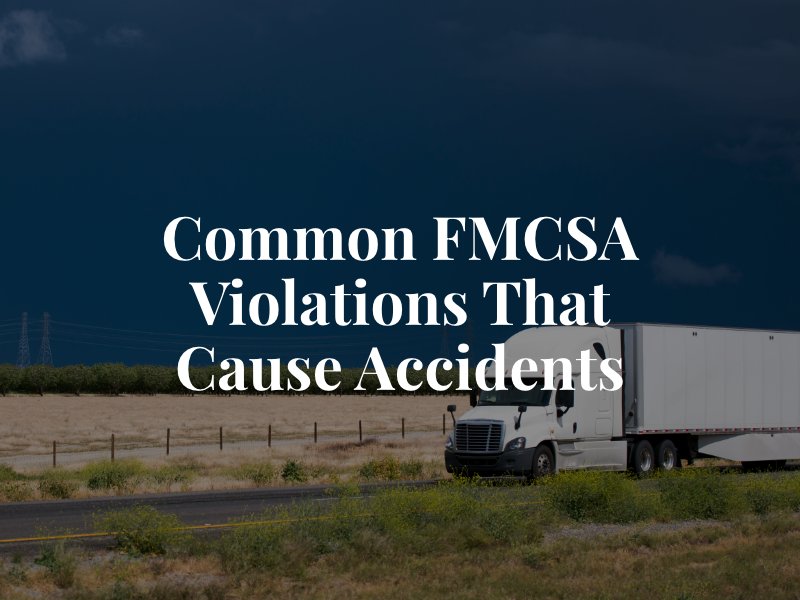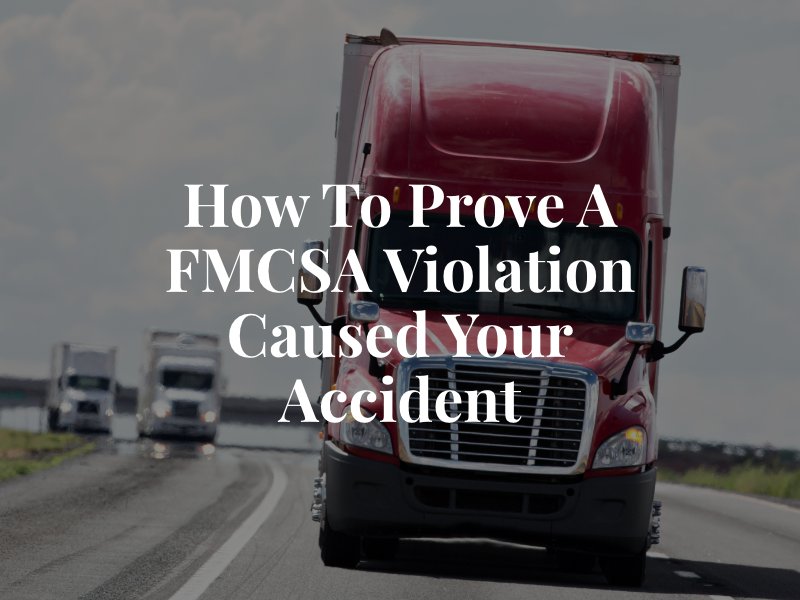The Federal Motor Carrier Safety Administration (FMCSA) is the regulatory body responsible for setting and enforcing safety standards for commercial motor vehicles across the United States. This agency establishes rules for driver qualifications, vehicle maintenance, hours of service, and equipment standards to help ensure that trucking operations are conducted safely.
When these standards are not met, FMCSA violations can directly contribute to trucking accidents. For victims involved in these incidents, identifying these violations is vital, as they can be strong evidence of negligence that played a role in causing injuries.

Common FMCSA Violations That Lead to Accidents
The Federal Motor Carrier Safety Administration (FMCSA) enforces regulations to ensure the safety of commercial trucking. Violating these rules can lead to serious accidents and significant injuries to anyone on the road. Below are some common FMCSA violations to be aware of.
Hours of Service (HOS) Violations
FMCSA’s Hours of Service regulations limit the number of hours a truck driver can operate before taking a mandatory rest period. These rules are designed to prevent driver fatigue, which is a major contributor to trucking accidents.
- Drivers may exceed allowable working hours to meet tight deadlines, leading to exhaustion.
- Fatigued drivers are more likely to make errors, such as delayed reactions or drifting out of lanes.
Fatigue-related accidents are particularly dangerous and can result in severe injuries or fatalities. Evidence of HOS violations, like driver logs or electronic logging devices, can be used to show that fatigue played a role in the accident.
Driver Qualification Violations
Drivers of commercial trucks must meet FMCSA’s qualification standards. These include holding a valid commercial driver’s license (CDL), undergoing medical screenings, and passing background checks.
- Unqualified drivers may lack the skills or knowledge required to safely operate a truck.
- Undiagnosed medical conditions, such as vision problems, could impair their ability to drive.
Showing that a driver failed to meet FMCSA requirements can strengthen a personal injury case.
Vehicle Maintenance Violations
FMCSA regulations require trucking companies to perform regular maintenance and ensure all vehicles are safe to operate. Failure to meet these standards often results in dangerous mechanical failures.
- Poor maintenance can lead to issues like brake malfunctions or tire blowouts.
- A truck with worn-out components may be unable to avoid collisions in an emergency.
Proving that a trucking company neglected proper maintenance can help establish fault, as the lack of upkeep directly endangers public safety.
Weight Limits and Load Restrictions Violations
Trucks must adhere to FMCSA’s maximum weight limits and guidelines for securing cargo. Overloading or improperly balancing a load increases the risk of accidents significantly.
- Overloaded trucks take longer to stop and are more prone to tipping over.
- Shifting cargo during transit can destabilize the vehicle, making it harder to control.
When overloaded or improperly secured cargo causes an accident, evidence of these violations, like weigh station records, can support claims against the driver or trucking company.
Drug and Alcohol Violations
FMCSA strictly prohibits the use of drugs or alcohol by commercial drivers. Companies are also required to conduct routine substance abuse testing to minimize risks.
- Driving under the influence impairs reaction time, decision-making, and motor skills.
- A driver who uses drugs or alcohol behind the wheel puts everyone on the road in danger.
If substance abuse contributes to a crash, toxicology reports and prior failed drug tests can serve as compelling evidence in personal injury cases.
Understanding these potential violations helps victims understand what could have caused the accident and who might be liable for their injuries.

Proving FMCSA Violations in Personal Injury Cases
A lawyer plays a vital role in proving FMCSA violations by gathering and presenting evidence that establishes negligence in trucking accidents. Here’s how these cases can be proven:
Thorough Evidence Gathering
A truck accident lawyer collects all relevant documentation from the accident scene, including electronic logging device (ELD) data, maintenance records, and inspection reports. This evidence is scrutinized to determine if the driver or trucking company violated FMCSA standards, which can directly contribute to an accident.
Utilizing Expert Witnesses
Expert testimony from transportation safety professionals or automotive engineers can clarify how FMCSA regulations were breached. These experts explain the impact of violations like overloading or poor maintenance, helping to link these lapses to the accident and the resulting injuries.
Detailed Record Review
A lawyer reviews driving logs, medical records, and company procedures to uncover discrepancies in following hours of service and driver qualification requirements. This investigation may reveal a pattern of noncompliance that supports a claim of negligence.
Navigating Regulatory Requirements
Understanding the details of FMCSA regulations is essential. An experienced lawyer uses this knowledge to argue how specific violations, such as failure to adhere to maintenance standards or drug and alcohol testing procedures, led to the accident.
Demonstrating FMCSA violations through meticulous investigation and expert analysis is a significant step in proving liability.
Importance of Legal Representation in FMCSA Violation Cases
Having legal representation when dealing with FMCSA violation cases can provide much-needed clarity and support for accident victims. An attorney’s knowledge and guidance can significantly impact the outcome of a case. Here’s how a lawyer can help and why it’s so important to work with one after an accident caused by a large truck:
- Attorneys understand the complexities of FMCSA regulations and how to apply them to your situation.
- They can help collect and analyze important evidence, such as driver logs and maintenance records.
- Legal professionals can interpret accident reports to build a stronger claim on your behalf.
- They negotiate with insurance companies to help ensure you are not pressured into accepting an unfair settlement.
Having experienced legal advocacy simplifies what can often feel like an overwhelming and confusing system, helping victims focus on recovery and the justice they deserve. If you have any questions about a truck accident case and what you’re entitled to, contact us today to schedule a free consultation with a personal injury lawyer.

